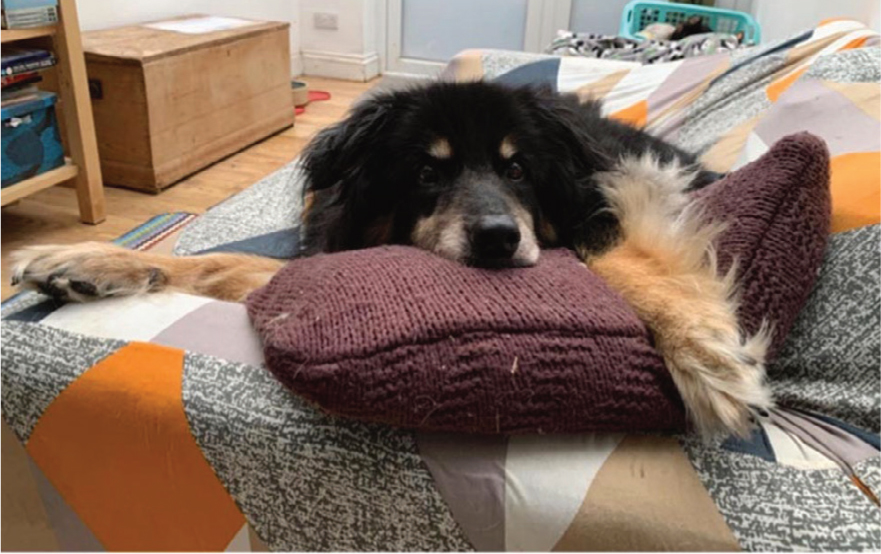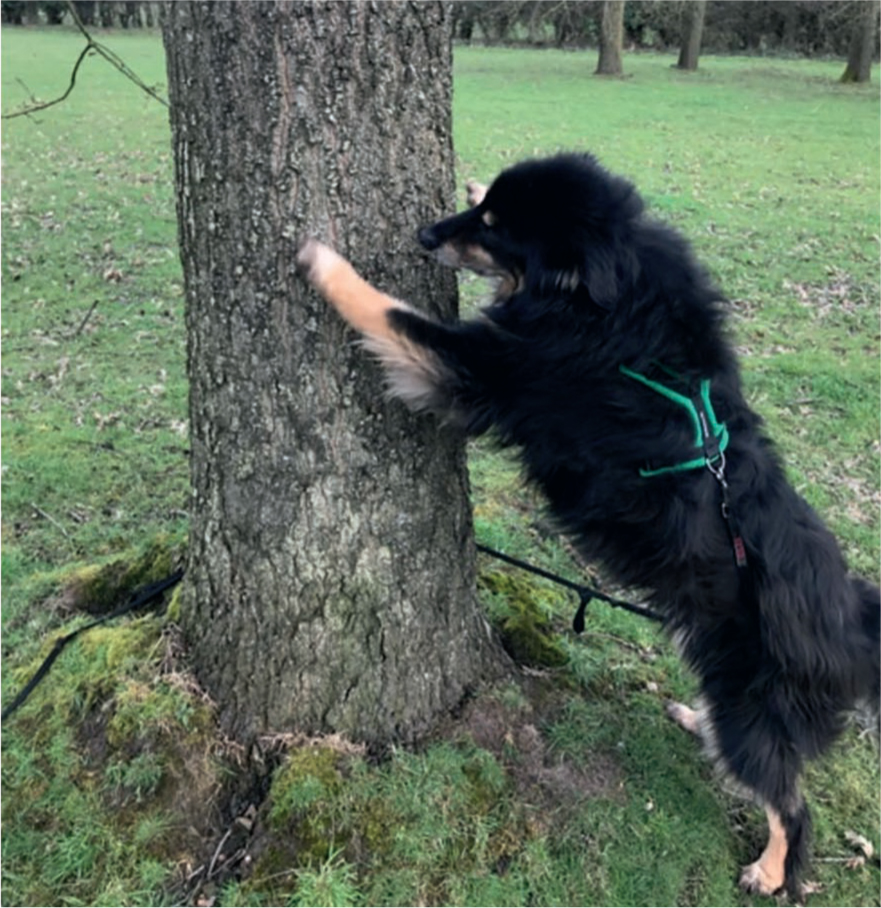Caring for dogs as they get older is both wonderful and heart breaking. Wonderful because they have been lucky enough to lead a full life and made old bones, but heart breaking to see previously energetic and sprightly companions struggle physically or emotionally with getting older. Dogs over the age of 7 years can be considered geriatric (Sanabria et al, 2013), and because of the advances in veterinary interventions and medicine, companion dogs are living far past their seventh year, with the average life expectancy spanning from 7 to 13 years (Lewis et al, 2018). Living longer carries the added risk of developing illnesses that are age-related – specifically diseases concerned with physical and mental health decline (Denenberg, 2020). Providing for an older dog's needs involves identification, diagnosis and monitoring of any health conditions, general mobility and wellbeing, along with adaptations to the environment and exercise plans (Canine Arthritis Management (CAM), 2022a). As dogs age, changes in their behaviour become an even more important indicator for potential illness and should be observed and monitored closely, alongside more regular veterinary visits, so that any health concerns are identified, diagnosed and treated early (Denenberg, 2020). Cognitive dysfunction syndrome (CDS) is a well-researched neurodegenerative condition that affects senior dogs, causing noise sensitivity (Mills et al, 2012), disorientation, altered interactions with people or other animals, sleep-wake cycle disturbances, house-soiling, and changes in activity level (Manteca, 2011). Being aware of the behavioural indicators of potential age-related illnesses (Table 1) can ensure early identification and diagnosis, meaning that any irreversible cognitive decline is prevented from worsening and current brain function can be safeguarded and protected to prevent or reduce the risk to quality of life associated with ageing (Pan, 2011). Diet, supplements and medication can alleviate and prevent the cognitive and mobility-related decline that dogs experience from age 8 onwards, and so proactive conversations with clients about these options should be a priority.
Table 1. Signs of cognitive dysfunction or brain ageing
| Condititon or category | Clinical signs |
|---|---|
| Disorientation | Less responsive to stimuliDecreased recognition of familiar people, pets or placesGets lost in familiar locationsGoes to wrong side of door (e.g.hinge side) |
| Interactions and social behaviour | Decreased or increased interest in social contact with familiar people or petsDecreased greeting behaviourNewly exhibited fear, avoidance or aggression towards familiar people or pets |
| Sleep/wake cycle | Restless sleep or waking at nightIncreased daytime sleep |
| House soiling | Indoor elimination at random sites (including sleeping areas) or in view of ownersDecreased or no signallingGoes outdoors, eliminates indoors on return |
| Activity: increased, decreased, stereotypic (displacement), repetitive | Increased wandering, pacing, restlessnessDecreased explorationDepression or apathyStaring, fixation or snapping at objectsLicking owners or household objects |
| Anxiety/agitation | Inappropriate vocalisationIncreased irritability, aggressionAimless pacing and wanderingIncreased or new fears or phobiasSeparation anxiety |
| Self-hygiene | Increased self-directed groomingDecreased grooming behaviour |
| Reduced learning and memory loss | Decreased responsiveness to known commands or tricksDecreased ability to perform tasksInability or slow to learn new tasks (must retrain) |
| Appetite | Increased volume or speed of eatingDecreased interest |
| Decrease responsiveness to stimuli | Not coming for verbal commands/treatsLess responsive or altered responses to visual, auditory and olfactory stimuli |
Adjustments to the home environment
Homes can be a challenge for older dogs that may be suffering from mobility issues or discomfort and/or sensory impairment affecting their eyesight or hearing. The leading sense for dogs is the sense of smell, as they have a highly developed olfactory system, and this can often mask any hearing or visual decline as they can map their environment using scent. For this reason, older dogs may become disorientated, confused or anxious if the home is redecorated or the configuration of the home is changed regularly. Along with maintaining a familiar environment, older dogs will benefit greatly from being able to move around the home with ease, so rugs and non-slip mats or runners should be put on floors that would otherwise provide little or no purchase or grip, such as polished wood, laminate or tiled flooring. Steps or ramps should also be used to allow older dogs to get on/off sofas and in/out or your car (Figure 1). It is wise to introduce these steps or ramps gradually and ideally from an early age — and certainly before they become a necessity. Use positive reinforcement and start with the ramp on ground so that your dog can acclimatise to the texture and movement before they also have to tackle a slope. ‘More rugs, less drugs’ (CAM, 2022b) is an interesting and effective concept that will reduce any potential pain or difficulty in mobility for dogs regardless of their age. While clients are seen in practice and the home environment is unlikely to be viewed first hand, information should be sought and appropriate additions and advice given during consultations to ensure safe and comfortable travel around the home for the dog.

Comfortable, good quality rest and sleep
Dogs spend around 50% of their day sleeping, and a good sleeping routine is vital for optimum physical and mental health (Broom and Fraser, 2015). Sleep-wake cycles in dogs are much shorter and more frequent than humans, with each sleep cycle varying from 15–45 minutes and as many as 23 cycles in an 8-hour period (Figure 2). This polyphasic sleep pattern consists of wake periods in between sleep cycles, which last an average of 5 minutes — this is usually when the dog may switch positions, move to another area of the room, rearrange their bed by scratching, digging, circling or snuggle up to their human for warmth or comfort (Adams and Johnson, 1993). In older dogs, this short period of wake can become a source of anxiety if they are confused about their surroundings, the temperature is not comfortable, or they cannot easily gain access to their human or canine family. Research has shown that given the choice, most dogs would prefer to sleep on the bed with or close to their owners (Kinsman et al, 2020). If a dog has always enjoyed co-sleeping, and this has changed as a result of mobility issues, clients may want to consider raised beds next to or steps up to the bed, to allow them to get on/off the bed easily and safely. Regulating a comfortable temperature involves moving around to avoid draughty spots, this can be more difficult for older dogs if it is painful or hard work to physically move from one spot to another. Dogs that sleep downstairs may also struggle once the heating goes off, so owners should take care to ensure adequate warmth in the winter and ventilation in the summer.

Owners also need to consider the location where their dog sleeps, the bedding that they prefer, and whether their bed provides adequate joint support, the areas of the house that are cooler/warmer and whether their dog has what they need for a comfortable night's sleep. The veterinary team should be on hand to suggest and support the client to make changes so that their dog can easily gain access to their preferred sleeping spots.
Physical exercise and mental activity
Maintaining an active lifestyle, which includes tailored and age-appropriate physical exercise and regular opportunities to engage in mental enrichment that caters for species-specific behaviours (sniffing, chewing, digging etc.), has been shown to significantly slow the progression of cognitive impairment (Wilhelmy and Landsberg, 2019). Regular routines can be simply tweaked to make them more appropriate for age-related mobility issues. Shorter walks, on-lead walks, not encouraging chasing a toy (which can be a strain on joints), and setting up scentwork games are good options for providing physical and mental exercise (Figure 3 and Box 1). Car trips or visits to loved ones' houses are also a good way of breaking up the day of an elderly dog, and providing them with some pleasurable, different experiences without risking the physical strain of other more strenuous activities, such as a long walk. The activity budget apportioned to play reduces significantly as dogs age and although research is lacking, play is considered to be a beneficial activity for both physical and mental health in older pets (Tomlinson, 2019). Therefore, if a dog has always enjoyed the company of other dogs, some supervised and well-matched play dates are something that should continue if they are keen and recover well from any extra exertion.

Box 1.Activities suitable for older dogsGo find — Hide a toy or treat in some longer undergrowth (being careful not to disturb wildlife!) and ask your dog to ‘go find’. You can either drop them secretly as you walk past a particular point and send your dog back, or if you have a good ‘wait’ command or someone else to hold your dog's lead, you can set up the game, and then return to you dog to release them.Treat tree — Exploring different surfaces and vertical tree trunks or fallen log (if safe and secure) is a fantastic way to engage your dog's nose and build their confidence at independent problem solving and proprioception exercises. Simply squish several soft treats into the bark of a log or tree, stand back and watch your dog go to work — it is a moment of calm for both of you.Food puzzles and chews — Some of these may be too difficult or frustrating if your dog is less mobile or has forgotten how to solve the puzzle. However, they can be a useful way of keeping the brain active so monitor closely and make the game simpler or more difficult as appropriate.Sensory enrichment — providing novelty in the form of olfaction is a simplistic way to enrich the day of an older pet that may not be mobile enough to explore places they previously enjoyed. Bringing home scents for them to sniff, or doing scent-cloth swaps with some of their dog friends will give them some new and pleasurable smells to investigate.
In multi-dog households that are walked together, an older dog may struggle to keep up with the younger members of the group, or may also feel anxious being left behind when they usually come along too. Some simple planning and alterations to your normal routine can ensure that all the dogs get what they need from their trip out, and owners can think about providing appropriate enrichment or puzzle feeders for dogs that are left at home. It is important to tailor walks and activities to reflect the requirements and capabilities of the individuals in the group, just as you would with a young puppy. Secure fields can be an excellent way of allowing everyone to walk at their own pace, or simply sniff around and enjoy the fresh air.
Observations and monitoring
It is recommended that all dogs that are considered senior have at least biannual veterinary examinations and health checks, with these appointments covering an evaluation of physical condition, vital signs, skin and coat quality, lymph nodes, hydration level, the cardiopulmonary system, central nervous system, abdominal and rectal palpitation, orthopaedic examination and laboratory tests, including urinalysis, faecal analysis, complete blood count and serum biochemical panel (Bellows et al, 2015). Simple checklists (Table 2) can also help owners to identify any changes, which can then be discussed with their veterinary team at an early stage, meaning that interventions can be put in place quickly (Box 2).
Table 2. Senior pet checklist (Seibert, 2017)
| Behaviour | Date | Date | Date |
|---|---|---|---|
| Disorientation | |||
| Appears lost or confused in familiar environment | |||
| Decreased ability to recognise familiar people or animals | |||
| Abnormal response (increased or decreased) to familiar objects | |||
| Difficulty performing previously learned task | |||
| Difficulty learning new tasks | |||
| Getting stuck in corners or behind furniture | |||
| Staring at walls or into space | |||
| Difficulty finding the door | |||
| Difficulty finding the food bowl | |||
| Does not respond to verbal cues | |||
| Social interactions | |||
| Changes in interactions with people, other animals (welcoming, playing, petting) | |||
| Decreased responsiveness to family members | |||
| Decreased affection towards, or interaction with, housemates | |||
| Change in exploratory behaviour | |||
| Increased irritability | |||
| Increased aggression (lunging, snapping, biting) | |||
| Intolerant of being left alone | |||
| Sleep-wake cycles | |||
| Sleeping more overall | |||
| Sleeping less at night | |||
| Abnormal night-time behaviours (vocalisation, wandering, motor restlessness) | |||
| House training | |||
| Elimination in random indoor locations | |||
| Elimination in sleeping area | |||
| Decreased signalling to go outside | |||
| Elimination indoors after a recent walk | |||
| Elimination at uncommon outdoor locaions (concrete) | |||
| Activity | |||
| Aimless wandering, motor restlessness, pacing | |||
| Decreased activity level | |||
| Loss of interest in food | |||
| Slower at obeying commands | |||
| Repetitive behaviours | |||
Box 2.Final thoughts and key considerations for owners of older petsOwners should:
- Avoid getting frustrated or shouting at their elderly dog. Instead, be patient, empathetic and understanding
- Monitor their dog carefully and use the checklists to help identify any changes in behaviour or mobility
- Have regular contact with their veterinary practice for regular pet health checks so that medical interventions can be put in place as soon as possible
- Audit their environment and make any necessary changes to make it easier for their dog to navigate including non-slip flooring, steps and ramps
- Tailor their walks or exploration of the great outdoors to suit their dog's physical capabilities
- Keep their mind and body active with activities that have positive effects on physical and mental wellbeing and health
- Enjoy every moment as best they can. Companion dogs are not here for a long time, so make it a good time..
Conclusions
As dogs enter their twilight years, it is vital to keep monitoring how they are coping day to day. Encouraging clients to keep diaries and educating them about the subtle changes to look for and the adjustments that may be necessary will help to provide ageing patients with what they all deserve — a happy, healthy and enjoyable retirement full of love, fun and comfort.
KEY POINTS
- Empowering owners to confidently identify and report physical or behavioural signs that may be related to ageing will assist with early diagnosis, intervention and treatment.
- Educating and informing owners about what to expect from their senior pet may reduce the potential for frustration and misunderstanding/conflict between owners and their pets.
- Veterinary professionals should encourage and support owners to make appropriate changes to their lifestyle as they age such as reduced expectations of their physical ability and providing additional mental enrichment activities.


